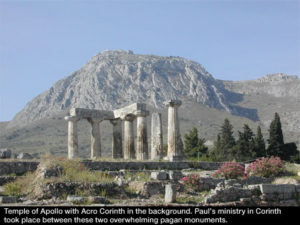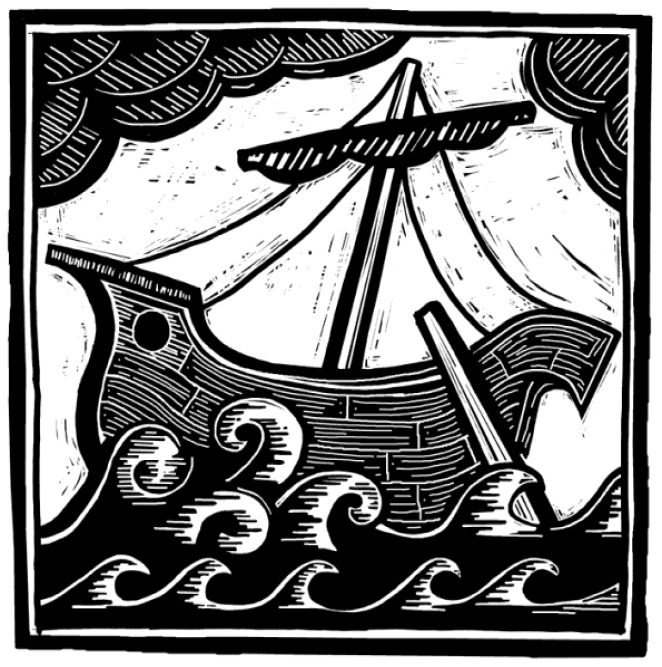 It is Sunday morning and the waterfront in Volos is very quiet. Saturday nights are noisy, with thousands of people walking the wharf, but mostly sitting along the waterfront in the cafés that are jammed with people eating, drinking and socializing. Last night, on one end of the wharf a live band played Greek music. We sit in the cockpit, as do the other people who have their boats tied stern to, to the wharf, watching people go by, listening to the low roar of the crowds conversing in Greek, the children shrieking as they chase each other around. But this morning, the waterfront is empty. Soon the church bells will begin ringing and people will fill the many Orthodox churches. This is the Greece of today; it has been this way, it seems, for centuries.
It is Sunday morning and the waterfront in Volos is very quiet. Saturday nights are noisy, with thousands of people walking the wharf, but mostly sitting along the waterfront in the cafés that are jammed with people eating, drinking and socializing. Last night, on one end of the wharf a live band played Greek music. We sit in the cockpit, as do the other people who have their boats tied stern to, to the wharf, watching people go by, listening to the low roar of the crowds conversing in Greek, the children shrieking as they chase each other around. But this morning, the waterfront is empty. Soon the church bells will begin ringing and people will fill the many Orthodox churches. This is the Greece of today; it has been this way, it seems, for centuries.
Will we still be here next Sunday morning? Very likely. But we THINK we are in the final stages of waiting for the documentation to be completed by the U.S Coast Guard. Our agent in Kentucky who is working on the documentation promises it will be soon. In the meantime, we keep finding more things that need fixing on the Aldebaran.
On Wednesday Janet and I rented a car and drove south to Athens and Corinth. In looking at our schedule we realized that we have been planning to be in the area of Athens during the Summer Olympics which does not seem like a good idea now. It is already difficult to visit Athens because it seems that everywhere there is frantic construction proceeding. So, while we are waiting anyway, we reason, let’s get a head start by working on some of the research.
 Two days in the ruins of ancient Corinth and climbing and poking around in Acro Corinth, the mountain that looms above. On its summit are a few remains of the Temple to Aphrodite which once attracted people from all over the Mediterranean to worship with the temple prostitutes. What an amazing place! We explore the ancient harbor of Cenchrea into which Paul sailed. I spend an afternoon in the ruins of Corinth, reading the Corinthian letters and scholarly research, and looking for clues of what Paul experienced during the 18 months he spent there during his second missionary journey in AD 51-52.
Two days in the ruins of ancient Corinth and climbing and poking around in Acro Corinth, the mountain that looms above. On its summit are a few remains of the Temple to Aphrodite which once attracted people from all over the Mediterranean to worship with the temple prostitutes. What an amazing place! We explore the ancient harbor of Cenchrea into which Paul sailed. I spend an afternoon in the ruins of Corinth, reading the Corinthian letters and scholarly research, and looking for clues of what Paul experienced during the 18 months he spent there during his second missionary journey in AD 51-52.
The day in the Corinthian ruins did not start out very promising. The evening before we had checked on the opening time. 8:30, the sign said. So, at 8:45 the next morning, we were there, ready for work. The guard was closing the gate. A hand written sign in English said: “Today site opens at 12:30 because of strike.”Janet thinks she might be able to stop a national strike by reasoning with the guard. Janet: “My husband came all this way to do research, and it is possible only today. We have to leave tomorrow.” The Guard: “Come at 12:30. We have not closed in 6 years, today is the only time we are on strike.” This is supposed to make us appreciate that it only closed today, when we are here, instead of during the preceding 6 years.
 So we go back up the mountain, Acro Corinth, to look again at the site of Aphrodite’s Temple. I discover that there are far more remains of war than love on the top of that mountain. While the oldest ruins are of the temple of Aphrodite, the goddess of love, subsequent ruins are clearly military fortifications; there is even a cannon. What started out as place for making love, becomes a place for making war. On Acro Corinth the gods of love and war have both left their imprint and it strikes me that there may be little difference between the two for the people could seek personal glory, power, status and life either way. How pagan, I thought.
So we go back up the mountain, Acro Corinth, to look again at the site of Aphrodite’s Temple. I discover that there are far more remains of war than love on the top of that mountain. While the oldest ruins are of the temple of Aphrodite, the goddess of love, subsequent ruins are clearly military fortifications; there is even a cannon. What started out as place for making love, becomes a place for making war. On Acro Corinth the gods of love and war have both left their imprint and it strikes me that there may be little difference between the two for the people could seek personal glory, power, status and life either way. How pagan, I thought.
Paul does not spend any time condemning either the flourishing worship of Aphrodite on the mountain above Corinth, or the military policies of the day that kept the system intact. Instead he re-defines love as self-giving.
Later, I look at Paul’s words about love from I Corinthians 13 that are inscribed on a white block of marble in four languages in a church in Old Corinth at the foot of the mountain. I am impressed by the contrasting picture of the two definitions of love from Aphrodite and Paul; in the background is the temple mountain, in the foreground the words of Scripture. Then, attempting to get a better angle for the photo, I back up a little farther, and there, only several yards from the words of love from Paul in the church yard, I see a war memorial in the viewfinder. How “Christian,” I thought.
Aren’t we all still tempted by the two idols of love and war? Don’t people still sacrifice themselves for the promises these powerful idols make? What do you think? What do you think Paul would say to this? Your comments are welcome.
I will be posting some additional reflections and photos from Athens and Corinth later this summer.
